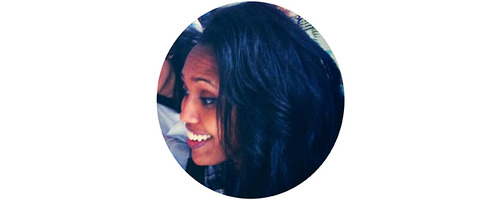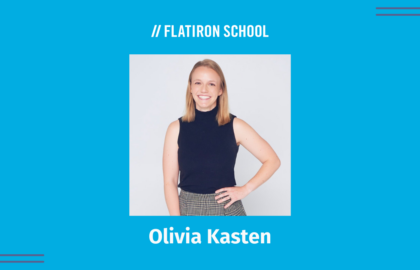
Web developer and prolific cartoonist, Saron Yitbarek enrolled in Flatiron School’s web immersive to chase a passion and kick off a brand new career. After a stint in writing and a couple years helping startups build their businesses, she decided that code was probably for her. After graduation, she took a position as a Hacker-in-residence at the New York Tech Meetup (NYTM)—the largest Meetup organization in the world— helping them to build and develop a platform for over 40,000 members. Now she’s heading up programming support community CodeNewbie before starting at Thoughtbot next month. Fresh out of a career change, Saron is familiar with what it’s like to make make big choices, doubt yourself, and overcome nerves and stereotypes to end up doing something you love. Here’s her advice on learning to program and making a new career from code:
Chase the “aha” moment
My “aha” moment happened while I was working at a startup. We taught entrepreneurship classes, and there was a point when it was obvious how much an app would help our workflow and our students. But no one on our team of three was able to actually build an app. I felt stuck and frustrated—knowing that if I just knew how to code, I could build some stuff, try it out, and test my ideas. The whole experience made it clear to me how incredibly limiting not being able to program was if I really wanted to be in the tech-startup industry long term. It was the final push I needed to try this whole coding thing. Still, I wasn’t totally convinced it was for me. So to make sure my “aha” moment wasn’t phony, I spent my summer going through the Flatiron Prework and after completing it, I was convinced. That’s when I applied to the school.
Don’t go it alone
There are so many things I want to tell people about learning to code. The biggest one is to not go it alone. It’s easy to get frustrated, and it helps to have people to help you or who are going through the same thing. A week before Flatiron started, I went to Hacker Hours—basically open office hours that happens twice a week. I got there and found people learning code together, and I thought , “this is awesome. There are all of these people—I can go up to anyone, ask them a question and get an explanation for anything. This is great.” My biggest recommendation is to find something newbie friendly like this. There are tons of resources out there, but you can also build this community yourself. Myself and a few other Flatiron alums started a Code Club. We read other peoples’ code—focusing more on context and understanding. It’s another opportunity to learn from the community, instead of me struggling with a code base on my own, and hoping to get something out of it. Where when we’re all together, I can leverage others’ experience, and we all end up with much richer information, a much better experience than we would if we were going it alone. I also started a community and weekly Twitter chat called #CodeNewbie to help people find each other, and provide them with a supportive community for people who don’t necessarily have access to a course. It started as a weekly Twitter Chat and now we’ve added a weekly podcast and an online forum. The best part about Flatiron School was learning with other new programmers who were passionate about code, and I wanted to recreate that community online. It was never meant to be a technical conversation—more about what people are working on and hearing about their coding journey.
Be OK with not knowing everything—or knowing nothing at all
One of the biggest things I’ve learned from this experience is that it’s OK to not know stuff. There were so many times throughout that program where I doubted myself—and Avi would just look at me and say, “Of course you can do it. What are you talking about? It’s going to be great.” He was always right. It made it a lot easier at NYTM—where we all had a lot of roles. There was no one person doing front end or back end or design. Our dev team of two, myself and fellow grad Vinney Cavallo, did everything. It was terrifying at first, but then it became a lot of fun. Whenever I’m faced with something that I’ve never done before or that just seems impossible, I can tell myself, “It’ll be great, you’ll do fine. It’ll be amazing.” And I know I can do it. Programming is a skill, but it’s also a journey. You can mentally equip yourself to take on the unknown, even if you’re not technically equipped, yet.
Don’t worry about whether or not you look like a programmer
I didn’t fit what my idea of being a programmer was—I don’t like video games and I didn’t fall into the stereotypes. There a lot of things that make me different. So I had to tell my heart that I don’t need to do those things, or look a certain way, to write code. When I’d say “I’m a web developer” I kept expecting people to be really confused or question me. But no one’s shocked. Now, I still don’t feel like I fit, but I found a lot of other people who feel the same way, and that helps a lot.
“I didn’t fit what my idea of being a programmer was… Now, I still don’t feel like I fit, but I found a lot of other people who feel the same way, and that helps a lot.”
And don’t get down when programming gets hard
There are a lot of people who start programming thinking it’s going to be really easy, it’s a sure fire way of getting a great job. So when they get stuck, or don’t understand a concept immediately, they’re really hard on themselves and get frustrated to the point where they can’t move past it. You just have to remember that it’s hard—and it’s not hard because you’re stupid, or because you don’t have a CS degree, or because you’re starting this later in life than other developers. It’s hard because programming is hard. Everyone gets frustrated and heartbroken and annoyed, and that’s just how it is. But the high of finally figuring it out, of getting to see your idea come to life, of telling the computer to do what you want it to do—that’s what makes it worth it. Every single time.Hear more from Saron on Ruby Rogues and from her RailsConf talk. You can also keep in touch with her on Twitter or on #CodeNewbies every Wednesday evening at 9PM EST.




